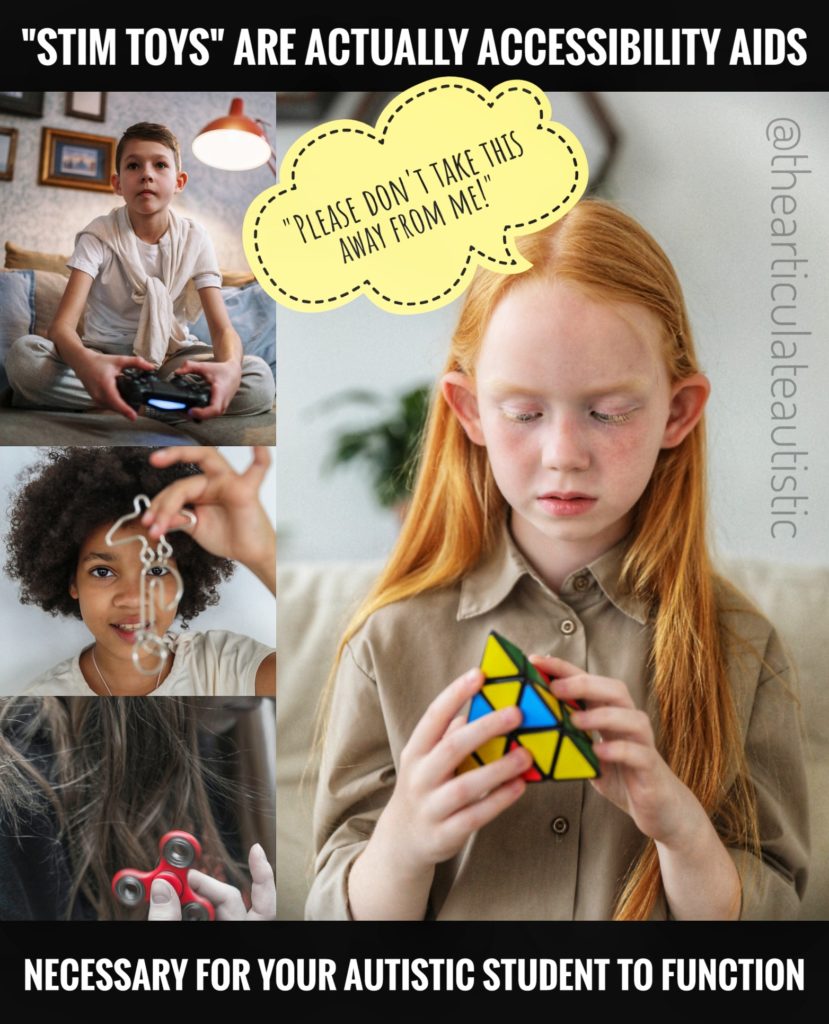“No More Stim Toys!” – What It Feels Like for an Autistic Person When You Take Away Our Sensory Aids

Someone I know who works with autistic children recently told me about a disturbing incident they observed between an autistic student and their teacher.
Apparently, this child was given a stim toy to play with to calm their anxiety, and before they could even begin to use it for self-soothing and emotional regulation, the teacher grabbed it out of their hand, yelled, “No more stim toys!”, and proceeded to throw it in the trash right there in front of the child.
Of course, the child had a meltdown.
This act utterly enraged me when I heard about it, and I needed some time to process my very strong and passionate feelings on the subject before I wrote about it.
What this teacher did tells me two things:
- The aim of the majority of schools and programs designed for autistic children is STILL to make them appear “indistinguishable from their peers”. In other words, the goal always seems to be to make the child appear “normal” whenever possible and discourage their natural autistic traits.
- Stim toys are seen as actual toys, and, even though that’s what they’re called, it’s misleading. Stim toys are accessibility aids for autistic people, and teachers, parents, and other professionals need to understand that.
Should We Change the Term Stim Toys to Sensory Aids?
Stim toys, in my opinion, should be referred to as sensory aids. When you hear about a teacher taking a tangle or a squishy away from a child in class because he or she is “not paying attention”, the teacher is praised for that action, as though they made a disciplinary decision and helped the child learn not to be “disruptive” or “rude” (or whatever they misunderstand the behavior to be at that time).
The teacher may think taking a stim toy (sensory aid) from an anxious autistic student is the same thing as taking away a cell phone from a bored neurotypical student who keeps scrolling through TikTok during class. This is not true at all, and this type of thinking is dangerous and can cause mental harm to the autistic person.
Let me address my earlier point first:
- The goal of teaching or working with an autistic student should NEVER be to change the person or make them behave in neurotypical ways to make their neurotypical counterparts more comfortable.
- Taking a stim toy (sensory aid) away from an autistic student is just as bad, demeaning, and inappropriate as taking a hearing aid away from a deaf student, a guide dog away from a blind student, glasses away from a myopic student, or a wheelchair away from a student without the use of their legs. It is cruel, full stop.
What Having Our Sensory Aids Taken Away Feels Like for Us
If you’re a neurotypical person reading this, I want you to imagine the last time you either had the flu or were hungover.
Remember that feeling of waking up, and the sun or the lights in your room were too loud? The sound of your dog barking or your child yelling was like a knife piercing through your ears?
When your spouse walked into the room to ask you a simple question, they might as well have been speaking a foreign language for all your muddled brain could understand?
Welcome to the type of experiences autistic people have every single day just by existing!
If a bath, a nap, a hot cup of tea, an old movie, or some silence was all you wanted while recovering from a wild night or a maskless individual who decided to cough on you at the grocery store, you would think those needs reasonable and in no way disruptive or bothersome to anyone, right?
Imagine if those things were not only taken away from you, but done in front of other people while you were feeling at your most vulnerable, AND you were also shamed and belittled for even needing them?
This is how an autistic person feels when everything is too loud, too bright, too jumbled, too confusing, and the one thing of comfort that we reach for in all this noise, the one thing focusing our thoughts and regulating our emotions is ripped away from us, and we are left with not only no way to regulate but knowing, deep down in our souls, that if we allow* all of those feelings, which are roiling inside of us like a volcano, to burst forth through us into a full-on meltdown, we could be sat on (prone position restraint–don’t EVER do this) and possibly killed?
*Most autistic people cannot “allow” or “disallow” a meltdown, it’s a neurological event, but there are some instances where we can feel it coming and head it off at the pass, so to speak. This is where sensory aids come in!
Can you, for one second, imagine that horror? That feeling of utter helplessness, fear, and shame? The sensory equivalent of being naked in a pile of snow in a freezing cold rainstorm while someone yells at you for reaching for a coat?
If you wouldn’t rip the dark glasses off a blind man or knock a mobility aid out from under a person with EDS, don’t take sensory aids away from an autistic person (unless we are actually harming ourselves or others with them). We need them just as much as any other person with a disability who requires accommodations and accessibility aids.




Loved the article 😊
Thank you so much for all the help you provide neurotypical parents like me! Is it possible for neurodivergents to use video games as a sensory aid?.My son who is autistic//ADHD has amazed me over the years by being able to listen to cyber school in the background once while either pacing back and forth, or walking in circles, or playing a video game and still be able do well in school with me scribing his answers. I have the accommodation to scribe for him because he has an autistic shutdown or meltdown with too much written or typed work. He is going through what I think is an autistic burnout from too much school work. Everything I have read about autistic burnouts say you need to let anyone going through this rest from whatever caused it by allowing them to engage in whatever their special interest is to calm them until they get past their autistic burnout symptoms. My son’s special interest is video games. His academic advisor told me I need to stop allowing him access to video games until after he completes his school work after he gets past this autistic burnout even though I explained to her his amazing ability to use it in the background and still do well in school in the past. It seems like both a special interest and a sensory aid for him.
Thank you for being open-minded and accepting of your son’s neurodivergence! I definitely do not agree with taking away your son’s video games. They’re not just games to him, they’re a sensory-regulation tool for him–a need. Good on you for following your instinct on that and taking a stand for your son’s needs! 🙂
Thank you for your answer! I value your advice. I am really worried about my 11 year old son and the things he is going through with what I think is autistic burnout right now from too much school work and the complete lack of support from everyone in his cyber school. I am fairly certain he also has undiagnosed Rejection Sensitive Dysphoria. Are there neurodivergent professionals that would be able to determine if he is going through autistic burnout as well as whether he has Rejection Sensitive Dysphoria? Is there an online neurodivergent community that would be able to help me help my son get the support he needs in school right now and possibly be able to recommend a better free cyber school with better neurodivergent support? He also gets migraines so he also needs a free cyber school that would work around those as well. I have two sons that are autistic/ADHD ages 11 and 13 and I would like to find a neurodivergent community that would help me get the support each of them needs. I unfortunately am also dealing with their completely unsupportive dad who my ex that spent many years and many text messages accusing me of making up their symptoms and their diagnoses and telling the multiple professionals that diagnosed them over the years to diagnose them with every diagnoses they have and continues to deny that our youngest son has actually been diagnosed with migraines even though he has by multiple professionals. He and his mother finally actually said they believe their autism/ADHD diagnoses but don’t believe they need the help the professionals that work with them say they do, so I unfortunately have to fight the people that should be supporting them the way I am.
Oh, good Lord! What is it with family members not believing neurodivergent traits? I swear, it’s the most common obstacle I hear about! I’m so sorry you’re dealing with this. I actually work with someone who may be able to help you. Please send me an email at: thearticulateautistic@gmail.com, and maybe we can set up a consult?
Yes absolutely! When I was in college I used audiobooks as part of my accommodations as physical reading is difficult for me. I would play a mindless video game (one without a lot of puzzles or complicated actions) usually a 2D platformer like Sonic the Hedgehog, and I would listen to my assignments on my iPad at the same time. This helped me to better focus on my reading assignment while keeping my hands busy
Should we change the term stim toys to sensory aids?
That’s actually a really good idea because doing so would analogise taking away a metal puzzle (for example) from an autistic child to removing a deaf child’s hearing aids from their ears.